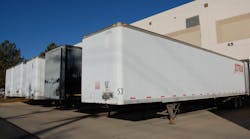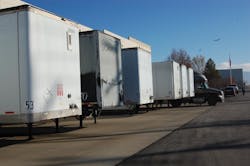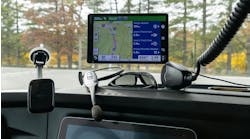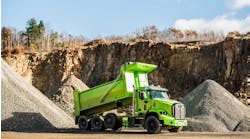The Internet of Things (IoT) is creating a lot of change within the transportation and logistics world, much of it disruptive in nature for trucking due to how it can help more deeply infuse the use of “Big Data” throughout the industry.
For motor carriers in particular, the IoT is being viewed by many as a way to bring more “intelligence” to trucking equipment, in terms of asset management, remote diagnostics, and the like – especially where freight trailers and containers are concerned, argues Derek Kuhn, senior vice president of BlackBerry IoT at BlackBerry.
Fleet Owner got a chance to pick Kuhn’s brain about how the IoT is going to continue upending the “traditional” view of trailers and containers as mere freight-hauling “boxes on wheels” – a process that’s been ongoing for some time now – especially in terms of how to better protect the valuable cargoes within them.
Trucking companies hear a lot about the ‘Internet of Things’ but why is the IoT so important to the future of trucking and logistics? In a nutshell, what is the IoT going to help those two ‘legacy’ industries achieve going forward?
The emergence of IoT tools for collecting and analyzing data has changed how many industries do business, including in the trucking industry. We see a similar shift that is taking place in fleet management, where fleet owners can leverage near real-time data to optimize the performance of their fleet.
Trailer and container tracking has been around for a long time; how will the IoT and tools like BlackBerry Radar make a difference?
Today’s fleet management systems mostly monitor truck cabs or tractors as a unit. That makes sense. It’s extremely important to monitor cabs to determine how long drivers have been working, how fast they’re driving and how far trucks are being driven between maintenance visits. Telematics technologies that enable this type of tracking are widely deployed, helping freight haulers improve efficiency and comply with regulations.
Trailers, which hold the goods that generate revenue, however, have traditionally been overlooked by the telematics industry. Market analysts at Berg Insight estimated that there were over 15 million trailers and swap bodies worldwide in 2013, with even more intermodal containers; 20 million. Yet for those 35 million units, fewer than 300,000 connected tracking devices were sold in 2013.
To better address the needs of the transportation and logistics industry, fleet managers need access to regular and up-to-date information about the total situational and environmental status of their trailers.
By focusing on the status of trailers, chassis, and containers, instead of the cab of the truck, we are creating a more complete, data-driven transportation and logistics ecosystem to improve decision-making.
BlackBerry Radar is an asset tracking platform that comprises a device, cellular connectivity, and a cloud-based software platform that hosts applications.
The platform also provides instantaneous alerts when user-defined events occur: for example, if a temperature sensor reading crosses a government regulated food safety threshold or a trailer enters or exists a geo-fence. With this range of sensor data and the frequency of updates, we can provide a near real-time system capable of supporting important business decisions such as:
- Theft detection – instant alerts greatly increases the chances that theft can be detected and prevented or recovered.
- Cold chain compliance – regular temperature measurements that exceed regulatory standards.
- Yard management – instant alerts on movement provide real time information about fleet location to support accurate yard management.
- Maintenance – More accurately tracking miles driven can help more effectively manage trailer maintenance schedules.
- Load analysis – We can measure cargo status and this is suitable for LTL scenarios, fleet leasing, and enhanced delivery management analysis
- Door events – the device can detect door open/close events which provides unique insight into delivery status and trailer usage
- Geo-fence control – Controlling based on location (e.g. using geo-fences) allowing users to “tune” the fleet to meet the unique needs of their business and processes.
- Deep data analysis – multiple years of data can be used to analyze trailer, fleet, and corporate performance over time and geography.
How much does it cost to put systems like BlackBerry’s Radar in place for a trucking fleet and how long a payback period does the fleet need? What affects the payback period?
The BlackBerry Radar service is sold as a monthly subscription, which includes everything necessary to start tracking trailers in as little as 10 minutes: device, cellular connectivity, mapping, hosted cloud services, reports, and applications. The monthly subscription price depends on whether the device is purchased or leased. The payback period or return on investment depends on each fleet, their use cases and mileage driven.
How does the tracking of trailers/containers open up avenues for more revenue for fleets? Walk through the steps; how does a fleet make the data from trailer or container monitoring pay?
Better data means better decisions, which all equals increased profits. Ultimately, the measure of a good trailer monitoring solution is the return on investment. By focusing on the unique challenges of fleet operators and the cargo they transport, devices like BlackBerry Radar provide a number of revenue generating or operational cost reduction opportunities including:- Automated yard checks: Wireless monitoring on trailers can tell fleet managers, where their cargo haulers are, making it easier to track freight and find empty trailers that are close to pick-up sites. Among other benefits, this can help reduce driver wait times and empty miles.
- Improving the customer experience and increasing trailer utilization: Dispatchers are looking to maximize the use and capacity of trailers. If a telematics system can tell them how much space is available for cargo, then they can more effectively balance loads and fleet usage for significant efficiency gains. Driver productivity can also be improved if the monitoring solution can tell managers when cargo is loaded or unloaded, avoiding the delays that often occur when transporters rely on customers or workers to notify them when trailers are ready for pickup or dispatch.
- Reducing the maintenance budget: Without a trailer management solution, fleet operators will often set static schedules for trailer maintenance, such as every six months, regardless of the miles traveled. Next-generation asset tracking systems can accurately measure miles driven and idle time to help determine a more cost effective maintenance cycle based actual usage.
- Protecting cargo integrity with temperature/humidity monitoring: Trailer monitoring can also help customers see whether their freight is being handled securely and with the level of care required. For example, knowing that a shipment of expensive wine or pharmaceuticals are being kept at the right temperature during transport can be very reassuring as well as mandated by emerging government regulations. Similarly, knowing when trailer doors are opened can be critical for shippers of high-value loads that might be targeted by thieves. Being able to prove cargo integrity from location to location is rapidly becoming a requirement for many types of goods and can help settle disputes with customers.
Cargo theft is a huge and growing issue in trucking: how can such IoT-based trailer and container tracking systems improve security?
Theft prevention requires a combination of deterrence and threat response. On the deterrence front, thieves will usually take the path of least resistance, such as stealing cars without alarms or bikes without locks, and targeting trailers without tracking devices. Our device, for example, is attached in a visible but hard-to-reach location.
Additionally, our trailer-tracking system is protected by BlackBerry’s data encryption and privacy protection technologies to provide confidence against the increasing risk of data interception and information system breaches.
Unlike traditional GPS systems, BlackBerry Radar collects location data in near real-time and transmits instant events to a fully-managed cloud-based system. The combination of accurate location and door information can be help fleet managers respond more quickly to theft events and this information can be used to build custom alerting to help support incident detection.
The system also has powerful geo-fencing capabilities, which allow fleet operators to provide virtual fences around high-risk areas for alerts on open doors or extended stops in high-risk areas to enable rapid response to theft. This translates into faster event detection, which gives fleet manager and law enforcement officials a major advantage.





